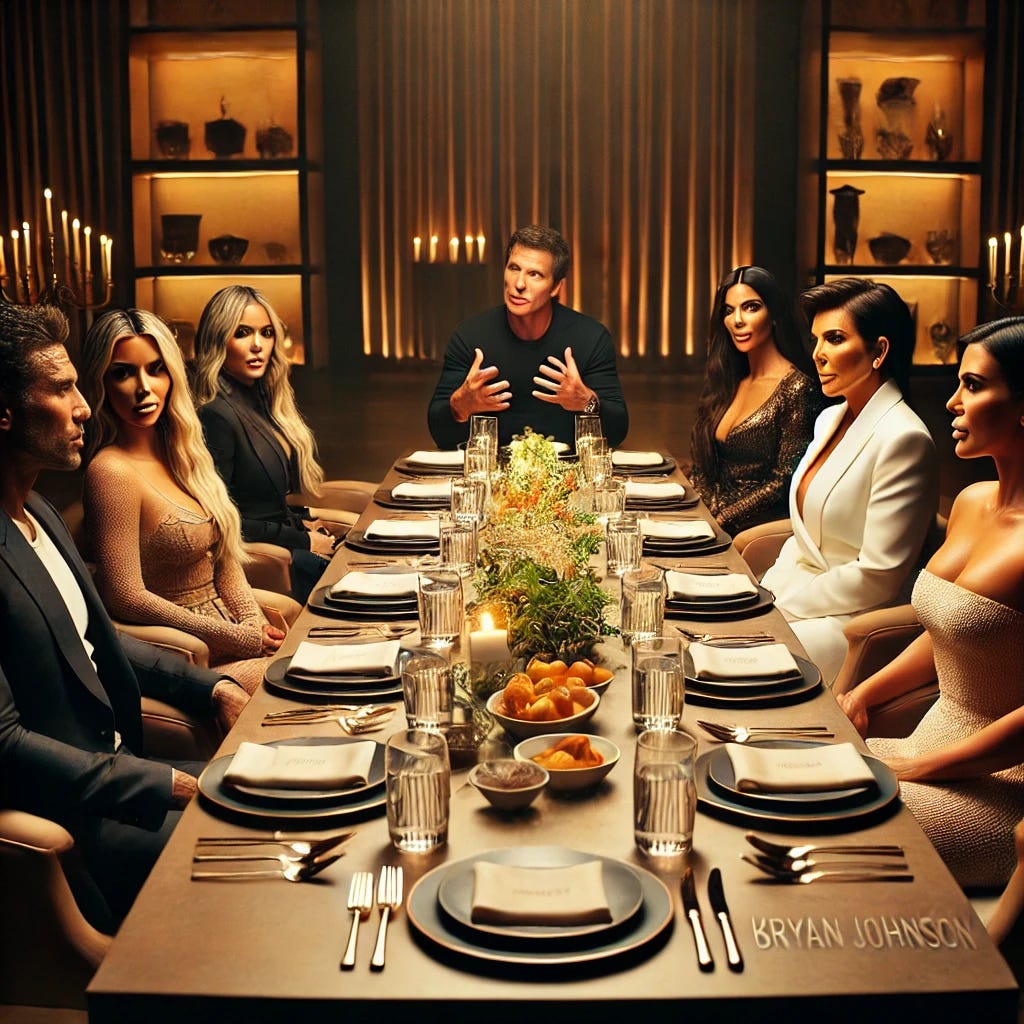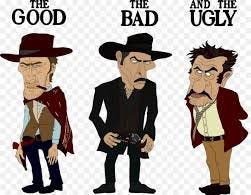How Far Would You Go to Live Forever?
Do you want to live forever?
What if you could have boundless energy, a sharp mind, and a body that moves like it’s decades younger? Imagine this: While the rest of the world ages at the usual rate—bodies deteriorating, minds slowing—you remain biologically decades behind. For every year they live, their bodies break down by two. Meanwhile, you're aging biologically just five months for every year you live. You’re thriving while the world around you fades.
But what would that mean for your relationships? If you had a child at 20, what would it be like to watch them grow old while you remain in your prime?
Would those extra years feel like a gift—or an endless, rainy Sunday? Would time become meaningless, or even more precious? Would you take your days for granted, or would the weight of existence grow unbearable?
My dad often quoted Susan Ertz to remind us to Carpe diem:
"Millions long for immortality who don't know what to do with themselves on a rainy Sunday afternoon."
How far would you go to live forever? I never cared about longevity until my body turned traitor—joints grinding, recovery stalling, death creeping closer. Lately, I’ve been consumed by thoughts of longevity, fasting, and health—topics I never used to think about. Not because I suddenly feel “old,” but because I realized that these things are at the very core of our existence, yet we rarely discuss them. When something captures my interest, I go all in—no half-measures. Longevity is no different.
The Journey Into Longevity
About a year and a half ago, I started seeing a physical therapist in hopes of avoiding surgery. The discussions quickly went to alternative healing and the first mind-bender she introduced was “urolithin A”—a compound making waves in the longevity world for its powerful effects on cellular renewal. Normally, I can jump into any conversation and hold my own, but this time, I was lost. The terminology was foreign, the science unfamiliar—but something about it stirred something unexpected within me.
I’d dabbled in trying to understand biohacking, listening to people like Gary Brecka, but these conversations flipped a switch.
Every session became a lifeline. I brought a notebook, frantically scribbling down every unfamiliar term. Back home, I’d dive into Google, frustrated when my attempts to spell obscure Latin root words got me nowhere. But I kept at it. And somewhere along the way, I created LongevityLand—a mystical, fictional world where the pursuit of vitality is a shared obsession for adding life to your years. A place where living well isn’t just the goal—it’s the way of life.
(Chapter 1 coming soon.)
Why Don't We Talk About This More?
Society drills us to dodge death with insurance and nursing homes—a shield to protect us against the inevitable. Why are we trained to ignore death? Should our only thoughts and conversations on the subject be about health cares costs, deductibles, Medicare Parts A and B?
What about the hard sell from a facility administrator that takes advantage of you when you are vulnerable? Only one bed left and you have four hours to decide if your ailing parent wants it. Why do these homes keep people alive just long enough for their money to run out? Why do we not talk about a society that trains its people to ignore their elders when they are not “up to the task”.
Why shouldn’t we center our conversations around health and longevity instead of our inevitable decline? Why not focus on extending the amount of healthy years we can spend with our families? Let us talk about adding life to your years, and in some places, that is exactly what is happening.
Enter Bryan Johnson: The Man that Wants to Live Forever
Bryan Johnson is an entrepreneur, investor, and biohacker on a relentless quest to reverse aging. After selling his company, Braintree, to PayPal for $800 million, he turned his attention to Blueprint, a meticulously engineered regimen designed to slow, and even reverse, the aging process. His goal? To achieve the biological age of an 18-year-old.
This isn’t just another health plan. Johnson tracks every metric imaginable, adheres to a rigid calorie-controlled diet, takes personalized supplements, undergoes medical treatments, and shares his data publicly in the pursuit of scientific progress.
To some, he’s a visionary. To others, he’s an extremist. To me, he is like a pioneer that ventured into space; Johnson is exploring uncharted biological territory. Is he pushing the limits of human potential, or is he just another man trying to outrun time?
The Urge to Push Boundaries
It’s human nature to test limits—to brave the unknown, settle rough territories, and chase the impossible. We’ve crossed oceans, scaled mountains, and tamed wild lands. Medicine advanced because daring minds refused to accept suffering as fate. From forming new nations to stepping on the moon, exploration has always defined us.
Pushing Biological Boundaries
And now, in the 21st century, the frontier has shifted. It's no longer just about conquering distant planets or external landscapes but the uncharted territory within ourselves. The frontier isn’t just geographical—it’s biological. Scientists have already unlocked powerful mechanisms like autophagy, the body’s built-in repair system, and they will continue to uncover other groundbreaking mechanisms on this new frontier.
So, is Bryan Johnson a modern boundry pusher? His methods spark fascination, skepticism, and ethical debates. While astronauts have pushed the boundaries of space, is Johnson is pushing the boundaries of biology? Some call him extreme; others call him revolutionary. But without risk-takers like him, where would we be?
Even if Johnson never finds the elusive fountain of youth, his pursuit forces us to ask: How far would you go to reclaim time?
Modern Day Explorer
Calling Bryan Johnson a "modern-day explorer" shifts the narrative. Some dismiss him as a narcissist, others as an eccentric biohacker. But what if he’s simply refusing to accept the rules that big business set for us—rules we passively signed up for without even realizing it? Like Johnson, I don’t remember agreeing to those terms.
Do I find him difficult to watch? Sure. I’m sure the feeling would be mutual.
Do I think he’s unethical? Not at all. He’s experimenting only on himself, using publicly available technology.
And let’s be honest—I’m not suicidal, and I do believe in big business. I just struggle with how they experiment on us every day.
As Mark Twain said:
"Lies, damned lies, and statistics"
But they don't just lie—they wrap it up in catchy jingles, line-dancing doctors and nurses, singing and smiling A1C patients, good looking and well dressed administrators, and corporate-funded studies that no one understands. Big business also gets help from our institutions:
Big Agriculture (BIG) poisons our food and lobbies to protect genetically modified crops.
Big Pharma (PIG) pushes medications that sometimes do more harm than good.
The CDC and FDA—do they always stay true to their missions, or do politics and profits steer their decisions?
So why is Johnson the one called extreme? Maybe he’s not the problem. Maybe he is the first public figure to say, "No, I won’t play by these rules." Maybe he’s just refusing to sign up for a rigged system.
And let’s remember: This life or ours is not a trial run. Don’t let some person make decisions for you. The most important lesson in life is ownership. Life is hard, and it comes out you fast. Nobody is going to save you. You must rely on yourself to make lasting changes. So thank you all for running the game—but I’m taking my ball and playing elsewhere. That’s exactly what Bryan Johnson did.
The Kardashians: Unexpected Longevity Advocates
Love them or hate them, the Kardashians are bringing longevity science into the mainstream media—and that matters. I don’t really know the Kardashians. I can barely recognize them on TV, and I don’t have the strong love-or-hate feelings that so many seem to. But one thing is undeniable: their influence is massive. And for that, I’m grateful.
Bryan Johnson hosted a "Don't Die" dinner with Kim Kardashian, Khloé Kardashian, Kris Jenner, plastic surgeon Dr. Jason Diamond, and neuroscientist Andrew Huberman. They gathered to discuss mortality, health optimization, and unconventional anti-aging techniques. An overview of the dinner was on a recent episode of The Kardashians, the family sipped shots of olive oil as a toast to Johnson’s regimen, an uncomfortable exchange about his erections, all while exchanging thoughts on longevity.
Built-In Megaphones: Social Media & Influence
When celebrities like the Kardashians engage with modern-day explorers like Bryan Johnson, their conversations reach millions. While longevity hasn’t fully stuck with mainstream audiences yet, I’m hopeful that the Kardashians and other influential figures will keep pushing the movement forward.
The Kardashians alone have a staggering social media presence—hundreds of millions of followers across Instagram, TikTok, and YouTube. Younger audiences will devour longevity trends, especially when they’re packaged in bite-sized, viral-friendly formats. A single post, story, or podcast appearance can instantly catapult biohacking and longevity into global conversations.
And when that happens, the media follows:
Headlines in: Vogue, Forbes, Business Insider, The New York Times
TV appearances: Talk shows, late-night interviews, reality TV subplots
Documentaries & YouTube deep dives: When celebrities endorse an idea, content creators dissect it for the masses
With this marketing engine in motion, what starts as a niche science-backed movement transforms into a full-fledged cultural phenomenon—one where millions adopt longevity practices not just for health, but because it’s the thing to do.
Double-Edged Sword
The Kardashians have immense influence, and their interest in longevity science could spark genuine curiosity and positive change. Concepts like biohacking, fasting, and preventative health might reach people who otherwise wouldn’t give them a second thought. But the risk? Complex science getting oversimplified into the next celebrity fad.
Still, I see it as a net positive. Once longevity science goes mainstream, it’s poised to become a trillion-dollar industry. Right now, it’s still in the early adopter phase—biohackers, scientists, and a handful of celebrities are experimenting. But when A-list names and billionaires start embracing longevity over Big Pharma, the rest of the world will follow.
If their platform gets people questioning their health choices and seeking credible information, that’s a win.
So what do you think? Are the Kardashians shedding light on something worthwhile, or will longevity just become another fleeting Hollywood obsession?
Big Pharma Will Fight Back
Pharmaceutical companies make their money on managing diseases, not curing them. If people start preventing aging-related illnesses with NAD+, rapamycin, autophagy-boosting fasting, and regenerative medicine, the need for most prescription drugs will likely plummet. That’s a multi-trillion-dollar threat to their business.
When a major A-lister—someone like the Kardashians, Tom Cruise, Keanu Reeves, or even Elon Musk—fully commits to longevity and starts publicly talking about it, that’s when the mainstream wakes up. Celebs dictate culture. If enough of them push this, Big Pharma won’t be able to suppress the movement.
Guys like Jeff Bezos, Bryan Johnson, and Peter Thiel starting pumping money into longevity research. The moment they crack a major breakthrough—like real age reversal, cellular reprogramming, or AI-driven health optimization—it’s going to be impossible to ignore.
Right now, longevity is growing in Silicon Valley, but when Asia, Europe, and the Middle East fully get on board, the industry will explode. Countries with aging populations (Japan, South Korea, China, and parts of Europe) have the biggest incentives to invest in longevity tech.
How Far Would You Go to Live Forever?
What if you could slow aging—biologically living decades younger while the rest of the world fades? This blog explores the pursuit of longevity, from personal health awakenings to cutting-edge biohacking. It dives into Bryan Johnson’s extreme anti-aging protocols, the ethical and scientific debates around reversing aging, and the role of social media in bringing longevity science into the mainstream.
With celebrities like the Kardashians amplifying the conversation, could longevity become the next global movement? Or will it be reduced to just another fleeting trend?
This isn’t just about adding years to your life—it’s about redefining what aging means. So, how far would you go to reclaim time?
I for one, want to add life to my years!
Update on the Marathon Training
Training Results: The Good, The Bad, and The Ugly
"When You Have To Shoot, Shoot. Don't Talk."
✅ The Good: Each week, I’m steadily adding time to my runs. Currently, I’m running about 1 hour and 30 minutes twice a week, along with a shorter run or a few pickleball sessions. The runs are becoming easier, and I’m managing to keep my heart rate around 110–120 bpm. As I work towards hitting 2 hours on my long runs, I’ll be shortening the other runs during the week. Going forward, my focus will be on one long run each week.
✅The Bad: I’m still a bit slow, and I’m definitely confusing my body with the mix of leg workouts, pickleball, and other athletic activities. The back-and-forth movement in pickleball, combined with everything else, is putting a strain on my hip flexors, glutes, and lower back.
✅ The Ugly: Recovery is slower than I’d like. It’s not painful, but I feel pretty tight. A friend suggested yoga, and I agree, but I’m struggling to find the time. I’m now stretching 1-2 times a day and rolling to try to keep things loose. I definitely need to double down on flexibility
📅 Week of April 2, 2025 – Test 2 @ Planet Fitness
Baseline Test 2 to measure increase in speed with fat adaption:
5-minute warm-up walk (3.5 mph, HR ~90 bpm)
3 rounds of:
2.5 min @ TBD mph → HR 113-116
2.5 min @ TBD mph → HR 120
5-minute cooldown walk
Recovery & Biohacking: A Few Days a Week
Cryotherapy (3.5 min): Reducing inflammation and managing pain
Infrared Sauna (30 min): Detoxification and cardiovascular health (violet light is key for more sweat)
Red-Light Therapy (12 min)












Been drinking my nightly olive oil regularly! My Garmin watch has also been lowering my fitness age (VO2) but primarily because I stepped up the exercise. Oh and my wife watches that show. I came in one day when this episode with Bryan Johnson was on.